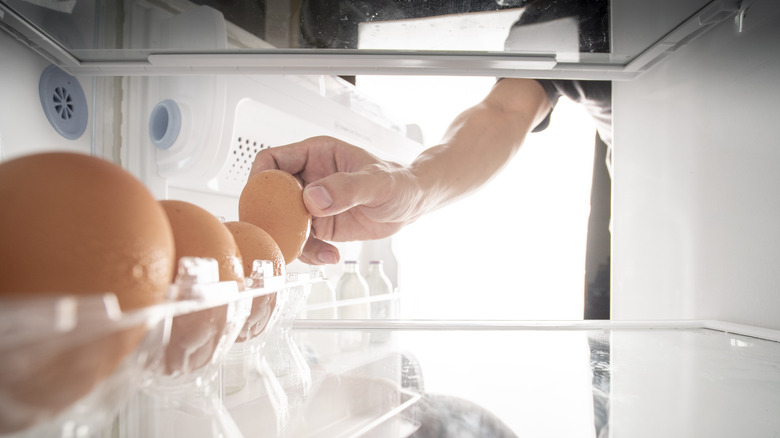Why You Shouldn't Store Eggs In Those Trendy Plastic Containers
In today's age of perfectly organized pantries and social media-worthy fridges, there can be a lot of pressure to put every single thing into an aesthetically pleasing plastic box. While most items are probably fine to remove from their original packaging, surprisingly, eggs are not one of them. It may not be the most pleasing to look at a gray cardboard egg container, but it is one of the best and safest ways to store your eggs. One of the most obvious benefits of using the egg container is that the best buy date is printed right on the box. If you toss the box and forget to record the date, you could risk eating a spoiled egg.
Even if you've been storing eggs wrong your entire life, it's not too late to make a change. Do you know that handy dandy egg holder built into some refrigerator doors? It turns out that's one of the worst places and ways to store eggs. To keep eggs fresh, you want to store them in the coldest part of the fridge, around 40 degrees Fahrenheit, to be exact. The back of the fridge stays the coldest, while the door can get warmer due to it being opened and closed. Even if the door container has an airtight seal, it's still not ideal to keep the eggs up front.
The best way to store eggs
If you're bulk buying eggs, like the 24-pack at Costco, it's extremely important to keep your eggs fresh for as long as possible. Surprisingly, with the invention of modern technologies, like your fridge, refrigerated eggs can last almost indefinitely. Once you're home from the store and ready to unpack, simply slide your egg carton to the back of the middle shelf, and you're good to go. If you happen to remove an egg, make sure you put it back in the carton the right side up, which may actually look upside down. Your natural instinct may be to position your eggs with their pointy end facing up, but this is incorrect.
Inside each egg's rounded side, there's a tiny air bubble. The air hole protects the yolk, which helps the egg stay fresher, longer. If you're dealing with farm fresh eggs, it's a slightly different story. If the fresh eggs were not washed with chemicals, like commercial eggs typically are, it's safe to leave the eggs unrefrigerated for about two weeks. If you're not going to use them within this time, the eggs can be stored in the fridge, the same way as store-bought eggs.

